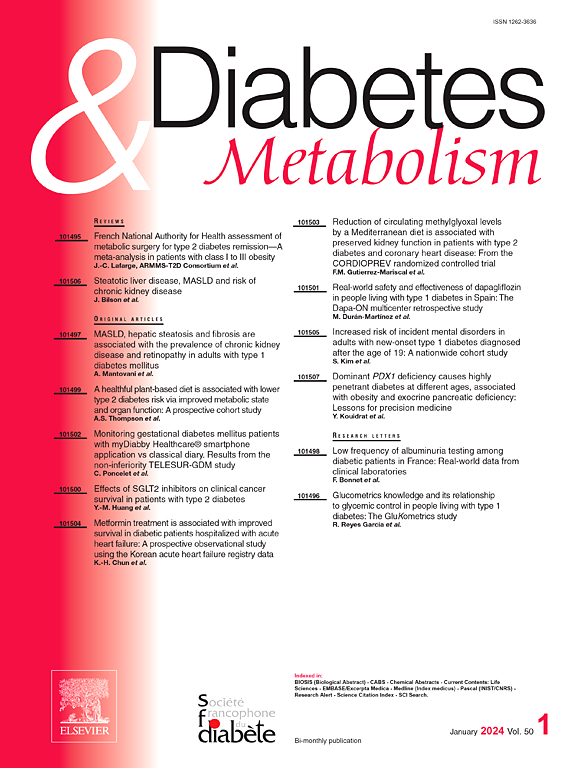Weight loss therapy and addiction: Increased risk after bariatric surgery but reduced risk with GLP-1 receptor agonists
IF 4.7
2区 医学
Q1 ENDOCRINOLOGY & METABOLISM
引用次数: 0
Abstract
Background
Obesity is an increasing public health problem because of its high prevalence and associated morbidity and mortality. Two weight-loss strategies are currently used, either bariatric surgery or pharmacological therapy with glucagon-like peptide-1 receptor agonists (GLP-1RAs). Preclinical studies in rodents suggested an increased risk of additive disorders after bariatric surgery contrasting with a reduced risk with GLP-1RAs.
Methods
An extensive literature search to detect clinical studies that investigated the prevalence of addictive disorders (food addiction, alcohol abuse, smoking, cannabis, cocaine, opioid use) following bariatric surgery or GLP-1RA therapy in obese patients.
Results
In observational cohort studies, the prevalence of alcohol use disorder was twofold higher after > 2 years following surgery (eleven studies, mainly with gastric bypass) whereas it was reduced roughly by half with GLP-1RA therapy (five studies, mainly with semaglutide). Similar findings were reported with other addictive disorders. An addiction transfer from food addiction to other addictive disorders is hypothesized to explain the increased risk after bariatric surgery. Several mechanisms are proposed to explain the favorable findings reported with GLP-1RAs, i.e. effects on the dopamine reward pathway, central GABA (gamma-aminobutyric acid) release, negative emotional stress associated with food/drug restriction and/or neuronal inflammation.
Conclusion
Available data from observational cohort studies confirm an increased risk of addictive disorders following bariatric surgery, contrasting with a reduced risk with GLP-1RA therapy. Both physicians and patients should be informed of the higher risk post-surgery whereas available promising results with GLP-1RAs should be confirmed in ongoing dedicated randomized controlled trials before any official indication.
减肥治疗和成瘾:减肥手术后风险增加,但GLP-1受体激动剂降低风险。
背景:肥胖是一个日益严重的公共卫生问题,因为它的高患病率和相关的发病率和死亡率。目前使用两种减肥策略,要么是减肥手术,要么是胰高血糖素样肽-1受体激动剂(GLP-1RAs)的药物治疗。啮齿类动物的临床前研究表明,与GLP-1RAs降低的风险相比,减肥手术后附加性疾病的风险增加。方法:广泛的文献检索,以发现调查肥胖患者在减肥手术或GLP-1RA治疗后成瘾性疾病(食物成瘾、酗酒、吸烟、大麻、可卡因、阿片类药物使用)患病率的临床研究。结果:在观察性队列研究中,手术后2年的酒精使用障碍患病率增加了两倍(11项研究,主要是胃分流术),而GLP-1RA治疗的患病率大约减少了一半(5项研究,主要是西马鲁肽)。其他成瘾障碍也有类似的发现。一种从食物成瘾到其他成瘾障碍的成瘾转移被假设来解释减肥手术后风险的增加。研究者提出了几种机制来解释GLP-1RAs对多巴胺奖励通路、中枢GABA (γ -氨基丁酸)释放、与食物/药物限制和/或神经元炎症相关的负性情绪应激的影响。结论:来自观察性队列研究的现有数据证实,与GLP-1RA治疗的风险降低相比,减肥手术后成瘾性疾病的风险增加。医生和患者都应该被告知手术后的高风险,而GLP-1RAs的有效结果应该在任何官方适应症之前在正在进行的专门随机对照试验中得到证实。
本文章由计算机程序翻译,如有差异,请以英文原文为准。
求助全文
约1分钟内获得全文
求助全文
来源期刊

Diabetes & metabolism
医学-内分泌学与代谢
CiteScore
12.00
自引率
4.20%
发文量
86
审稿时长
13 days
期刊介绍:
A high quality scientific journal with an international readership
Official publication of the SFD, Diabetes & Metabolism, publishes high-quality papers by leading teams, forming a close link between hospital and research units. Diabetes & Metabolism is published in English language and is indexed in all major databases with its impact factor constantly progressing.
Diabetes & Metabolism contains original articles, short reports and comprehensive reviews.
 求助内容:
求助内容: 应助结果提醒方式:
应助结果提醒方式:


